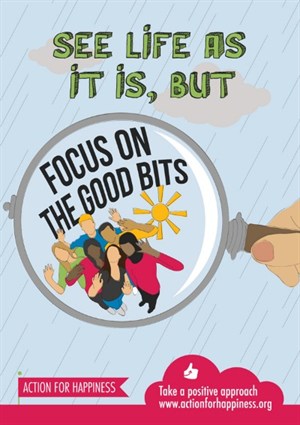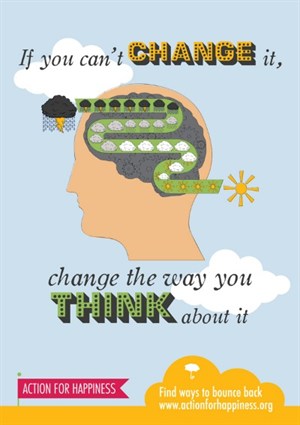The Science of Happiness
05 Aug 2014 | Bridget Glenville-Cleave

Last night I joined 500 other people in London to hear a talk on
The Science of Happiness by Dr Tal Ben-Shahar,
organized by the UK's leading happiness movement, Action for
Happiness in partnership with the Wholebeing
Institute.
As well as authoring several books, Tal Ben-Shahar lectured on positive psychology
at Harvard University - in fact, his course quickly became the most
popular that Harvard ran, attracting many hundreds of students
every year. This was one of the reasons I wanted to go to the talk:
anyone who can engage undergraduates on that scale must have
something special to offer.
Since the talk was in central London there was a good chance it
would be attended by a fair number of UEL MAPP graduates and students, so I guessed
it would be a great opportunity to reconnect. I was right - I saw
more than a dozen people I knew, and got to meet a few more
too.
And my other reason for going is that there are always different
ways of looking at things or new insights to be had - perhaps new
positive psychology research findings or simply the benefit of a
new perspective on an old subject.
1. The Importance of Paying Attention to Reality
(or 'What you see is what you get')
"We see what we look for and we miss much of what we are not
looking for even though it is there…. Our experience of the world
is heavily influenced by where we place our attention" (Stavros
& Torres)
Tal Ben-Shahar started by explaining some of the background and
history of positive psychology, how it could be useful in today's
world where more people are suffering from debilitating conditions
such as stress, anxiety and depression at a younger and younger
age, despite rising economic wealth and better physical health.
He made several important points. Psychology's traditional
response to helping people has been to focus on what is going
wrong. We ask 'why is that child failing?" and hope that with
sufficient analysis and discussion of the problems we will find the
right answer. Positive psychology encourages us to take a different
perspective and to ask an altogether different question: "why is
this child succeeding despite the same unfavorable circumstances?"
Studying how and in what conditions people flourish is far more
likely to enable others to flourish than studying how and in what
circumstances people do not.
He went on to emphasize that positive psychology isn't the same
as self-help, positive thinking or Pollyanna-ism. It's not about
sticking our heads in the sand and ignoring the bad stuff going on
in the world, or denying our negative emotions or the other
difficulties we experience in life - it's about seeing life as it
really is, the downsides and the upsides. The problem is that often
the downsides get our fullest attention, whereas we let the upsides
slip by unnoticed.
Obviously if we focus our attention on something, it looms
larger (observational selection bias again). But did you know that
focusing on one thing crowds out our ability to notice other
things? If you're not convinced, take this selective attention test.
It's not just about what we chose to focus on, however. What we
know from the science of positive psychology is that feeling
negative emotions tends to close us down, but feeling positive
emotions broadens our horizons and builds additional resources,
helping us be more creative, effective, resilient, persistent and
to reach out to others.
Positive psychology has a big role to play in helping us cope
with the downsides, and at the same time to recognize, maximize and
appreciate all the upsides. By attending to our well-being and
boosting our positive emotions, Tal Ben-Shahar explained that we
enable ourselves to take more effective action in dealing with
life's difficulties. "Positive emotions don't make us blind to
life's hardships", he said, "they are the fuel which enable us to
go out and do good in the world".
So focusing on well-being isn't really about ignoring reality or
about wanting happiness for the sake of it; happiness matters
because it contributes to other important outcomes. It enables us
to put the most into life and get the most out of it.
2. The Importance of Language and and Asking the Right
Questions
(or, 'Words create Worlds')
Tal Ben-Shahar's second point is linked to the theme of
attention - that our reality is shaped by the language we use
everyday, and in particular the questions we ask. If our language
is negative, it's no surprise if the world we see seems negative
too. Asking the wrong questions can mean we spend a lot of time and
effort focusing our attention on the wrong things.
Take our relationships. During the first few years of a
relationship, partners seem perfect to each other - they can do no
wrong - it's as if our faculties of critical judgment have been
switched off. Then when the honeymoon period is over, things start
to go a bit pear-shaped; we notice those annoying little habits all
the time.
We ask "Why does she always leave the lid off the tube of
toothpaste?" or "Why does he never put the loo seat down?" And what
typically happens then? We start asking what is wrong in the
relationship and our attention is drawn to everything that is
negative. Our reality ('this relationship is going down the tubes')
is determined by our negative thoughts, questions and language.
Instead, we should focus on what is working in the relationship,
what we do well as a couple, what first attracted us to each other,
and do more of those things we enjoy doing together.
Summing up the importance of asking the right question, Tal
Ben-Shahar quoted the great management writer and thinker Peter
Drucker: "The most serious mistakes are not being made as a result
of wrong answers. The truly dangerous thing is asking the wrong
question".


3. The Importance of Appreciation
(or, 'You don't know what you've got till it's gone')
Interestingly the word 'appreciate' has several meanings, all of
which are relevant to happiness:
- To recognize the full worth of something
- To be grateful for something
- To increase in value
The first two are related, insofar as when you rate something
highly, you're more likely to feel grateful for it. Unfortunately
for many of us, the first time we really recognize the full worth
of something is when we've lost it. So the point here is to stop
and think now about what you value in your life - it's long been
known in positive psychology that counting your blessings on a
regular basis makes a lasting difference to your well-being.
Tal Ben-Shahar then explained how expressing gratitude for
something makes it appreciate in value, setting up a kind of
virtuous circle.
So, the simplest way to bring the three themes of paying
attention, asking the right questions and appreciation together is
to focus on what went well today. We did this in pairs at the start
of the talk, but my partner David, who runs his own training
company, was stumped. 'It's really hard to think of something', he
said, scratching his head for a minute. I had to agree. Even after
8 or so years working in the applied field, it sometimes takes
longer than you'd think to answer this question. Which is why it's
so important to try - verbalizing those positive things makes them
an enduring part of your life narrative, rather than something that
just gets lost in the mists of time.
And it turns out that the most important question to finish with
is not "did you enjoy it?" (yes we did Tal and Action for
Happiness, thank you so much!) but, "what are you going to do
differently as a result?" For me, the answer lies in going back to
reconnect with people who for one reason or another I've lost touch
with.
---
Bridget Grenville-Cleave holds a Masters
degree in Applied Positive Psychology and has over 20 years
experience in organisations, working as a business consultant,
positive psychology trainer and lecturer. For more see workmad.co.uk
References
Ben-Shahar, T. ( 2007). Happier: Learn the Secrets to Daily Joy
and Lasting Fulfillment. New York, McGraw-Hill.
Fredrickson, B. L., & Joiner, T. (2002). Positive emotions
trigger upward spirals toward emotional well-being. Psychological
Science, 13, 172-175.
This article originally appeared on the Workmad blog and is reproduced here with
permission.